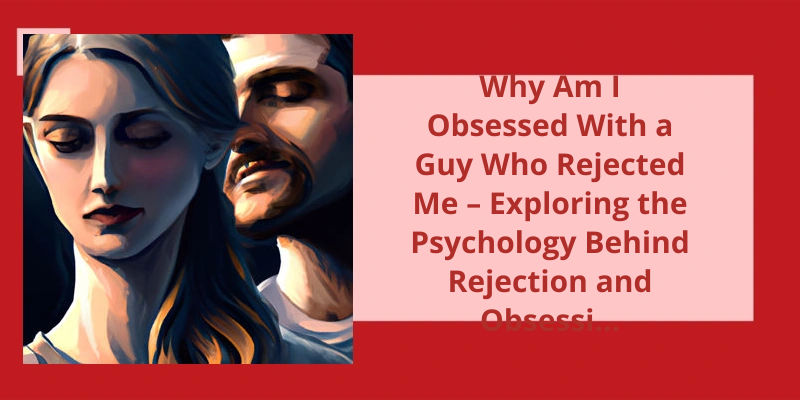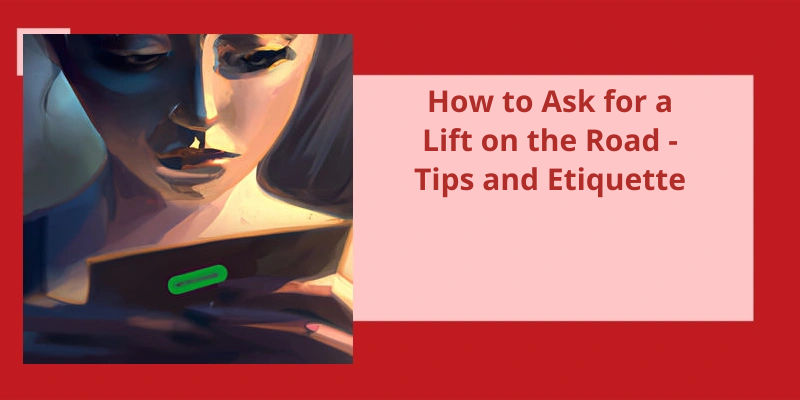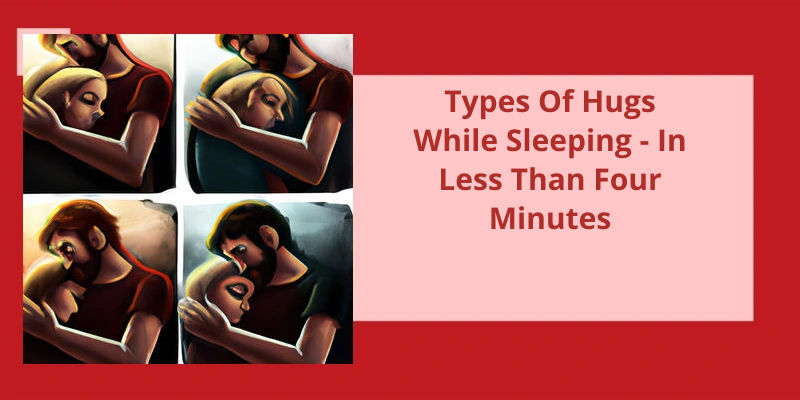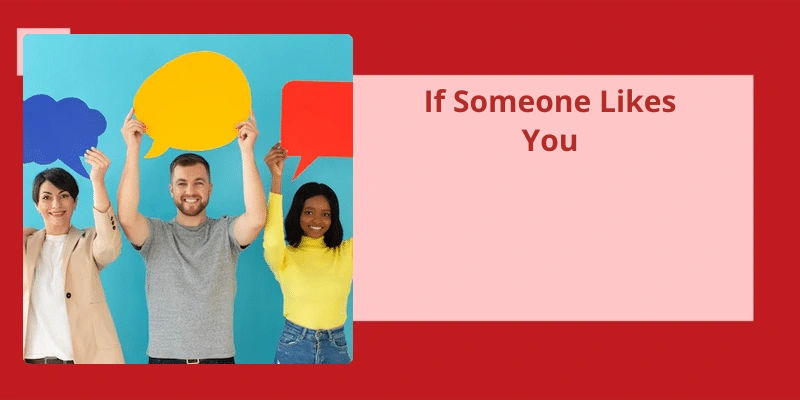Have you ever found yourself unable to stop thinking about someone who rejected you? Perhaps you can't shake the feeling that they were the one who got away, and you're convinced that you'll never find anyone quite like them again. It's a common experience, and one that can leave you feeling confused and frustrated. But what’s it about romantic rejection that makes us so obsessed with the person who said no? According to research by renowned anthropologist Helen Fisher and her colleagues, it all comes down to the way rejection stimulates certain parts of the brain associated with motivation, reward, addiction, and cravings. So if you're struggling to move on from someone who rejected you, don't beat yourself up – your brain is wired to respond this way.
What Is the Meaning of Rejection Breeds Obsession?
You may find yourself consumed with finding out why this person rejected you, even though you knew deep down that the relationship had run it’s course. You may feel like youre stuck in a hole that you cant seem to climb out of, like youre constantly living in the past and unable to move forward. This is because rejection breeds obsession.
On a biological level, rejection activates the same regions of the brain as physical pain. When you experience rejection, your body releases cortisol, the stress hormone, which can lead to feelings of anxiety and despair. Studies have shown that rejection can even affect your self-esteem and sense of self-worth. And when you start obsessing over the person who rejected you, youre essentially trying to alleviate those negative emotions by seeking out the source of them, even if that source is no longer healthy for you.
When we experience rejection, our brains interpret that as a threat to our survival. Were wired to want to belong to a tribe or community, and when were rejected by someone we thought was part of our tribe, it can really mess with our sense of belonging. We may feel like weren’t good enough, or that weren’t worthy of love and connection.
So how can you break the cycle of rejection breeding obsession? First, acknowledge that what youre feeling is normal and natural – everyone experiences rejection at some point in their lives. Then, try to focus on your own well-being and self-care. Practice mindfulness, exercise, eat healthy foods, and surround yourself with supportive friends and family. It may also help to seek professional help, like therapy, to work through your emotions and develop healthy coping mechanisms.
Ultimately, the best way to move on from rejection is to shift your focus from the past to the present and future. Instead of obsessing over what you could have done differently or what went wrong, focus on what you can learn from the experience and how you can use that knowledge to grow and improve.
Understanding the science behind our attachment to those who reject us can help us break free from this unhealthy cycle of obsession. It’s important to recognize that our brains are wired to seek connection and acceptance, but sometimes we may become fixated on individuals who aren’t capable or willing to reciprocate those feelings. By recognizing the patterns behind our behavior, we can work towards healthier relationships and self-growth.
Why Do I Obsess Over People Who Rejected Me?
In other words, when we’re rejected, our brains react in much the same way as they’d if we were experiencing withdrawal from a drug. We may find ourselves constantly checking our phones or email accounts, hoping for a message or a reply from the person who rejected us. We may also find ourselves obsessively thinking about the rejection, trying to figure out what we did wrong or how we could have done things differently so that we might have a chance at being accepted in the future.
One of the reasons we may obsess over people who reject us is that we see them as a challenge. We believe that if we can just win them over, if we can just convince them to give us a chance, then we will have accomplished something great. We may also feel like we’re proving our worth, that if we can get someone who’s rejected us to change their mind, then we must be valuable and desirable.
Another reason we may obsess over people who reject us is that we feel like we’ve invested a lot of time and emotion into the relationship. We may feel like we’ve put so much effort into winning this person over that it would be a waste to just give up and move on. We may also feel like we’ve a lot to lose if we let go of this person, such as our self-esteem or our sense of identity.
We believe that this person has the power to make us whole, to fill the void in our lives that we feel when we’re alone. We may believe that if we can just win them over, then we will finally be happy and fulfilled. However, the reality is that no one person can fulfill all of our needs, and we will never find true happiness and contentment until we learn to love ourselves and accept ourselves for who we are.
Obsessing over people who reject us is a common experience that many of us have gone through. Whether we’re trying to prove our worth, seeking a challenge or simply searching for love and acceptance, the underlying reasons for our obsession are often rooted in our brains and our emotions. However, by understanding the reasons why we obsess, we can begin to take steps towards letting go and finding true happiness and fulfillment within ourselves. It may be difficult, but it’s possible to move on from rejection and find love and acceptance in new and unexpected places.
The Difference Between Healthy Persistence and Unhealthy Obsession in Pursuing Someone
- Healthy persistence involves pursuing someone while taking their boundaries and preferences into consideration.
- Unhealthy obsession involves disregarding someone’s boundaries and preferences and continuing to pursue them despite their discomfort or lack of interest.
- Healthy persistence respects the other person’s autonomy and acknowledges that they’ve their own agency and preferences.
- Unhealthy obsession can stem from a need for control or validation and can be harmful to both the pursuer and the person being pursued.
It’s tough when someone you’re interested in rejects you, but how you handle the situation can make a big difference if you hope to salvage a friendship or even reignite something more. In order to attract a guy who rejected you, it’s important to take the high road and act in a way that shows maturity, kindness, and a willingness to continue the relationship in a platonic capacity. Here are some tips to help you navigate this potentially tricky scenario.
How Do You Attract a Guy Who Rejected You?
If he rejected you because he wasnt ready for a relationship, take his word for it and don’t pressure him. Give him space and time to figure out what he wants. In the meantime, focus on your own goals and interests. Pursue your passions and work on improving yourself. This won’t only make you a better person, but may also catch his attention and make him realize what hes missing out on.
Another way to attract a guy who rejected you is to be confident and self-assured. Show him that you respect yourself and won’t settle for less than what you deserve. Confidence is attractive and can be a powerful tool in getting what you want. It may also make him question why he rejected you in the first place.
Additionally, be open and honest with him about your feelings. Let him know that you still have feelings for him, but also communicate that you understand and respect his decision. This can help build trust between you and may even spark new feelings on his end.
However, if he rejected you because he simply isnt interested, it’s important to accept this and move on. Continuing to pursue someone who’s no interest in you isn’t only futile, but can also be emotionally damaging. It’s important to prioritize your own mental health and well-being in these situations.
Ultimately, attracting someone who’s rejected you requires a delicate balance of self-improvement and communication. It’s important to respect their decision, while also making it clear that youre still interested. Remember to prioritize yourself and your own goals, and be open to the possibility of finding love elsewhere.
It’s clear that rejection is something that affects many of us deeply, with research showing that our brains react as if we’re experiencing physical pain. But why is this the case? Let’s explore the reasons behind why rejection can trigger us so much.
Why Does Rejection Trigger Me So Much?
This is because our brains have evolved to prioritize social connection for survival. Throughout human history, being accepted by a group meant access to resources, protection, and the ability to pass on our genes. Being rejected meant vulnerability and potential danger. Our brains have adapted to respond to rejection as a threat to our survival, which is why it can feel so painful and intense.
Rejection can also trigger feelings of shame and inadequacy. When we’re rejected, our brain may interpret it as a sign that we aren’t good enough or worthy of love and belonging. These feelings can be extremely painful and cause us to doubt ourselves and our abilities. It’s important to remember that rejection is usually not a reflection of our worth as a person, but rather a mismatch between our needs and someone else”s.
Rejection can also bring up past traumas and unresolved emotional wounds. If we’ve experienced repeated rejection or abandonment in our lives, a new rejection can feel like reopening an old wound. It can be helpful to explore these past experiences with a therapist and work on healing those wounds.
Lastly, rejection can trigger a fear of the unknown and uncertainty. When we’re rejected, we may not know what our future holds or how to move forward. The uncertainty of the situation can be overwhelming and anxiety-provoking. With time and support, we can navigate through the unknown and come out stronger on the other side.
Overall, rejection is a natural and common part of life. While it can be painful and triggering, it’s important to remember that it doesn’t define us as individuals. By recognizing our brain’s response to rejection and working on healing past wounds, we can learn to cope with rejection in a healthier and more resilient way.
Source: Why rejection hurts so much — and what to do about it |
Conclusion
Additionally, it ignites our motivation to pursue the individual who turned us down, as we seek to regain their affection and approval. While this may seem counterintuitive and even painful, it’s a common human experience that can be managed with time, introspection, and support from loved ones. It's important to recognize that our worth and value as individuals aren’t determined by the affection of others, and that healing from rejection is a gradual but essential part of personal growth. Ultimately, while the feelings of obsession can be intense and challenging to navigate, it’s possible to move forward and find healthy and fulfilling relationships in the future.






